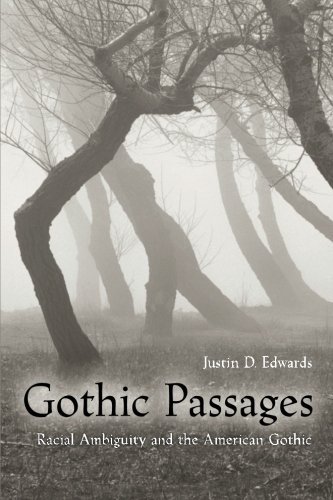Gothic Discourse Meets Hybridity in the United States [Book Review]Posted in Articles, Book/Video Reviews, Media Archive, Passing on 2010-09-06 01:39Z by Steven |
Gothic Discourse Meets Hybridity in the United States [Book Review]
H-net Reviews
July 2003
Justin D. Edwards. Gothic Passages: Racial Ambiguity and the American Gothic. Iowa City: University of Iowa Press, 2003. xxxiii + 145 pp., ISBN 978-0-87745-824-1.
In the past decade, gothic studies have produced a number of new readers, research handbooks, and student guides, and launched a new scholarly journal, Gothic Studies, developments which have, among other things, consolidated and somewhat stabilized the field (if one can speak of stability in the context of the gothic). At the same time, however, the question of what “gothic” really means routinely comes up for fundamental scrutiny and reevaluation in scholarly debates{which the above-mentioned guides also gleefully participate in. This is a good moment, therefore, to be moving in new directions with well-tried problems: the field provides solid theoretical and methodological grounding, yet the new definitional openness of the “gothic” also allows explorations of unfamiliar “gothicisms” and “gothicizations.”
Justin Edwards’s Gothic Passages makes use of precisely this possibility by intersecting two established fields, the scholarly exploration of the American Gothic and the analysis of passing and racial ambiguity in American literature and culture. Thoroughly researched and well argued, the book identities the “gothicization of race” and the “racialization of the gothic” as two interrelated phenomena throughout the nineteenth century. Edwards’s intersection of scholarly concerns suggests that recent reconsiderations of the “gothic” may require further complication, particularly in the study of the American literary and cultural gothic…
Read the entire review here.
